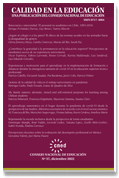Teacher Perceptions on the Evaluation of Professional Performance in Mexico
DOI:
https://doi.org/10.31619/caledu.n57.1195Keywords:
teacher evaluation, educational reform, professional performance, perceptionsAbstract
In Mexico, the need to improve educational quality persists, which includes evaluating teacher effectiveness. However, evaluating professional performance is a complex task. Research on the subject agrees that the application of comprehensive models, based on standards and multiple indicators, is required. This article qualitatively analyzes the perceptions and experiences of a group of elementary school teachers in the public system -from eight States of the Mexican Republic- about the process of professional evaluation they were part of, in the framework of the Educational Reform implemented during the six-year term 2012-2018. The participants indicated that they were in favor of the evaluation, they considered that it serves to know their positive aspects and areas of opportunity, and that they require constant training and updating processes to help them in their work. They also identified difficulties in the implementation of the evaluation process: aspects from other contexts were not adapted to the particularities of Mexico; the evaluation was based on threats, which demotivated teachers; and uncertainty and miscommunication was a big issue.
Downloads
Published
Issue
Section
License
Authors retain their Copyright and only transfer a part of these to the journal, accepting the following conditions:
Authors keep their rights as authors and guarantee the right to the journal for the first publication of their work, which is simultaneously subject to the Creative Commons Attribution license allowing third parties to share the study accrediting the author and first publication in this journal.
Authors may adopt other non-exclusive license agreements for distribution of the version of the published work (e.g. inclusion in an institutional thematic file or publication in a monographic volume) accrediting initial publication in this journal.
Authors are allowed and recommended to share their work over the Internet (e.g. in institutional telematic files or their website) before and during the submission process, which may lead to interesting exchanges and increased citation of the published work. (See The effect of open access).

